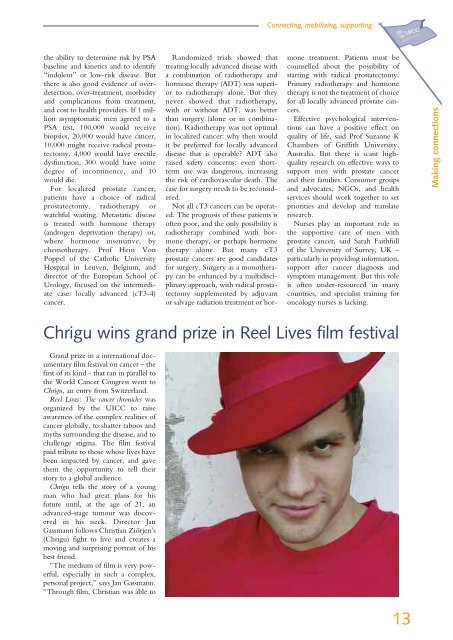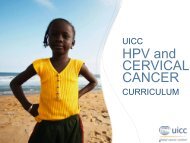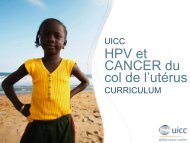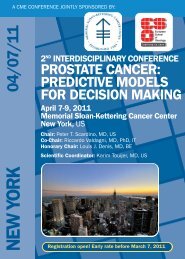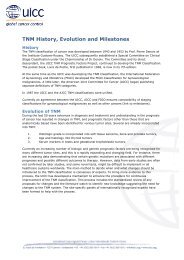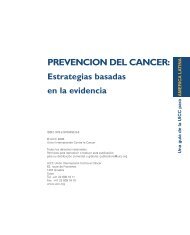Annual Report 05 - International Union Against Cancer
Annual Report 05 - International Union Against Cancer
Annual Report 05 - International Union Against Cancer
Create successful ePaper yourself
Turn your PDF publications into a flip-book with our unique Google optimized e-Paper software.
the ability to determine risk by PSA<br />
baseline and kinetics and to identify<br />
“indolent” or low-risk disease. But<br />
there is also good evidence of overdetection,<br />
over-treatment, morbidity<br />
and complications from treatment,<br />
and cost to health providers. If 1 million<br />
asymptomatic men agreed to a<br />
PSA test, 100,000 would receive<br />
biopsies, 20,000 would have cancer,<br />
10,000 might receive radical prostatectomy,<br />
4,000 would have erectile<br />
dysfunction, 300 would have some<br />
degree of incontinence, and 10<br />
would die.<br />
For localized prostate cancer,<br />
patients have a choice of radical<br />
prostatectomy, radiotherapy or<br />
watchful waiting. Metastatic disease<br />
is treated with hormone therapy<br />
(androgen deprivation therapy) or,<br />
where hormone insensitive, by<br />
chemotherapy. Prof Hein Von<br />
Poppel of the Catholic University<br />
Hospital in Leuven, Belgium, and<br />
director of the European School of<br />
Urology, focused on the intermediate<br />
case: locally advanced (cT3-4)<br />
cancer.<br />
Randomized trials showed that<br />
treating locally advanced disease with<br />
a combination of radiotherapy and<br />
hormone therapy (ADT) was superior<br />
to radiotherapy alone. But they<br />
never showed that radiotherapy,<br />
with or without ADT, was better<br />
than surgery (alone or in combination).<br />
Radiotherapy was not optimal<br />
in localized cancer: why then would<br />
it be preferred for locally advanced<br />
disease that is operable? ADT also<br />
raised safety concerns: even shortterm<br />
use was dangerous, increasing<br />
the risk of cardiovascular death. The<br />
case for surgery needs to be reconsidered.<br />
Not all cT3 cancers can be operated.<br />
The prognosis of these patients is<br />
often poor, and the only possibility is<br />
radiotherapy combined with hormone<br />
therapy, or perhaps hormone<br />
therapy alone. But many cT3<br />
prostate cancers are good candidates<br />
for surgery. Surgery as a monotherapy<br />
can be enhanced by a multidisciplinary<br />
approach, with radical prostatectomy<br />
supplemented by adjuvant<br />
or salvage radiation treatment or hor-<br />
Connecting, mobilizing, supporting<br />
mone treatment. Patients must be<br />
counselled about the possibility of<br />
starting with radical prostatectomy.<br />
Primary radiotherapy and hormone<br />
therapy is not the treatment of choice<br />
for all locally advanced prostate cancers.<br />
Effective psychological interventions<br />
can have a positive effect on<br />
quality of life, said Prof Suzanne K<br />
Chambers of Griffith University,<br />
Australia. But there is scant highquality<br />
research on effective ways to<br />
support men with prostate cancer<br />
and their families. Consumer groups<br />
and advocates, NGOs, and health<br />
services should work together to set<br />
priorities and develop and translate<br />
research.<br />
Nurses play an important role in<br />
the supportive care of men with<br />
prostate cancer, said Sarah Faithfull<br />
of the University of Surrey, UK –<br />
particularly in providing information,<br />
support after cancer diagnosis and<br />
symptom management. But this role<br />
is often under-resourced in many<br />
countries, and specialist training for<br />
oncology nurses is lacking.<br />
Chrigu wins grand prize in Reel Lives film festival<br />
Grand prize in a international documentary<br />
film festival on cancer – the<br />
first of its kind - that ran in parallel to<br />
the World <strong>Cancer</strong> Congress went to<br />
Chrigu, an entry from Switzerland.<br />
Reel Lives: The cancer chronicles was<br />
organized by the UICC to raise<br />
awareness of the complex realities of<br />
cancer globally, to shatter taboos and<br />
myths surrounding the disease, and to<br />
challenge stigma. The film festival<br />
paid tribute to those whose lives have<br />
been impacted by cancer, and gave<br />
them the opportunity to tell their<br />
story to a global audience.<br />
Chrigu tells the story of a young<br />
man who had great plans for his<br />
future until, at the age of 21, an<br />
advanced-stage tumour was discovered<br />
in his neck. Director Jan<br />
Gassmann follows Christian Ziörjen’s<br />
(Chrigu) fight to live and creates a<br />
moving and surprising portrait of his<br />
best friend.<br />
“The medium of film is very powerful,<br />
especially in such a complex,<br />
personal project,” says Jan Gassmann.<br />
“Through film, Christian was able to<br />
13<br />
Making connections


